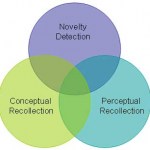cognitive psychology
tags: writer's block, psychology, abnormal psychology, cognitive psychology, writing, publishing, career, publish or perish, researchblogging.org,peer-reviewed research, peer-reviewed paper, journal club
Sources:
Didden, R., Sigafoos, J., O'Reilly, M., Lancioni, G., & Sturmey, P. (2007). A Multisite Cross-Cultural Replication of Upper's (1974) Unsuccessful Self-Treatment of Writer's Block. Journal of Applied Behavior Analysis, 40 (4), 773-773 DOI: 10.1901/jaba.2007.773
Upper, D. (1974). The unsuccessful self-treatment of a case of "writer's block". Journal of Applied Behavior…
An astonishing recent discovery in computational neuroscience is the relationship between dopamine and the "temporal differences" reinforcement learning algorithm (which Jake describes wonderfully here, and I've described in a little more detail here). The essential principle is that the difference between expected and received reward can be used to drive learning, and that this abstract learning theory can be tracked by the spikes and dips of dopamine in vivo (for under-expectation and over-expectation of reward, respectively).
However, one aspect of dopamine release is not accounted for…
Synaesthesia refers to the phenomenon where certain perceptual stimuli induce an unrelated and illusory perception - for example, a digit-color synaesthete may experience a sensation of the color green whenever exposed to the number 3. The relationships between the inducers and the induced synaesthetic experience are widely considered random; one anecodotal explanation is that letter-color synaesthesia could reflect a childhood memory of the particular colors used inrefrigerator magnet letters.
A recent Current Biology article from Kadosh, Henik and Walsh turns this common wisdom on its…
"Priming" refers to a pervasive phenomenon in which the repetition of a particular stimulus, response, or thought process facilitates its subsequent use. Might this phenomenon extend to more "executive" capacities as well?
In a recent article from theJournal of Experimental Psychology: Human Perception and Performance, Verbruggen, Logan, Liefooghe & Vandierendonck explore the phenomenon of repetition priming in the stop-signal paradigm. The stop signal paradigm requires subjects to make one or more "Go" responses to a particular stimulus class (typically, to press one button in response…
I've been meaning to post about this set of studies for a while, but because it's relevant to Chapter 4 of Lakoff's The Political Mind, I figured I'd better get around to it before I write the review of that chapter.
It's been a while, but in the past, I've talked a lot about new theories of moral judgment, and Jonathan Haidt's social intuitionist model in particular. Under Haidt's view, moral judgments are largely intuitive (that is, unconscious, automatic, and non-deliberative), and instead of being based on ethical principles, which we use mostly for post-hoc rationalization, they're…
There's an interesting short paper by Paul Bloom and Susan Gelman in the July issue of Trends in Cognitive Science with that title. Unfortunately, it's not yet available without a subscription (though Bloom tends to put his papers on his website once published, so it might show up there sometime in the near future), but if you have a subscription or access to a university library, you can read it here.
If you're not familiar with the idea, "psychological essentialism" is the belief that entities have an internal set of necessary properties, or an essence, that make them what they are. For…
Got your attention, right? That's the title of a paper by Penn, Holyoak, and Povinelli in April's Behavioral and Brain Sciences. Well, the full title is "Darwin's mistake: Explaining the discontinuity between human and nonhuman minds." Here's the abstract:
Over the last quarter century, the dominant tendency in comparative cognitive psychology has been to emphasize the similarities between human and nonhuman minds and to downplay the differences as "one of degree and not of kind" (Darwin 1871). In the present target article, we argue that Darwin was mistaken: the profound biological…
Interesting (and short) video of a talk by Joshua Klein (via HENRY) on how smart crows are, and how we might use their intelligence:
Last month, a paper was published in Nature, in which Kay et al(1) were able to guess which of their stimuli a person was seeing by looking at their fMRI scans. The model looked something like this (from Kay et al's Figure 1, p. 352):
The image the participant is seeing is on the left, the numbers in the middle represent receptive fields, and the predicted brain activity is on the right. Just compare the predicted brain activity for each image to actual brain activity, and whichever matches the best is the image the person was viewing when they produced that brain activity. Simple, right?…
You know, just the other day, on this very blog, I swore I would never read another (cognitive) imaging paper again, but between then and now, I've read 5 of 6, so apparently my oath didn't take. It's sort of like my constantly telling myself, as I ride the bus to campus in the morning, that I'm going to stop drinking coffee. As soon as I get off the bus, I walk 30 or so feet to the little coffee stand where they have my 16 oz. coffee waiting for me, 'cause they know as well as I do that I ain't quittin'. Cognitive neuroscience is like coffee.
Anyway, one of the imaging papers I've read since…
I really do love illusions of all sorts, in large part because they fit nicely into my narrative about the fallibility of human thought, but illusions are also great as windows into the ordinary working of our brains. For example, color afterimages provide direct evidence for opponent-processing theories of color vision, and when we find aftereffects for a particular class of stimuli, we can be pretty certain that class of stimuli has particular neurons or populations of neurons that encode it. And speaking of aftereffects, there's a really cool paper in the March issue of the journal…
One of the criticisms of most false memory research is that it lacks ecological validity. For example, in the Deese-Roediger-McDermott (DRM) paradigm, a common method for inducing false memories in the lab, involves giving participants a bunch of words (e.g., bed, rest, nap, snore, etc.) that are all associated with another word that's not presented (e.g., sleep). During recall, if you ask participants if they saw the word "sleep" after seeing a list of its associates, they're pretty likely to tell you that they did. But it's difficult to know how to generalize the DRM to real-world…
In case you haven't seen it already, there's an article on the embodied cognition "revolution" in the Boston Globe.
This, I think, is the best point to take away from it:
"I think these findings are really fantastic and it's clear that there's a lot of connection between mind and body," says Arthur Markman, a professor of psychology at the University of Texas. He remains skeptical, though, that the roots of higher cognition will be found in something as basic as the way we walk or move our eyes or arms.
"Any time there's a fad in science there's a tendency to say, 'It's all because of this…
There's a paper in the December 2007 issue of Psychological Science titled "Google and the Mind: Predicting Fluency With PageRank." Here's the abstract:
Griffiths, T.L., Steyvers, M., & Firl, A. (2007). Google and the mind: Predicting fluency with PageRank. Psychological Science, 18(12), 1069-1076.
Abstract
Human memory and Internet search engines face a shared computational problem, needing to retrieve stored pieces of information in response to a query. We explored whether they employ similar solutions, testing whether we could predict human performance on a fluency task using PageRank…
I've been posting about moral cognition anytime a new and interesting result pops up for a while now, and every time I think I've said before, though it bears repeating, that every time I read another article on moral cognition, I'm more confused than I was before reading it. Part of the problem, I think, stems from a tendency towards theoretical extremes. For a long time, in fact for most of the history of moral psychology, empirical or otherwise, some form of "rationalism" dominated. That is the view that there are ethical rules in our heads, and that moral judgment involve applying those…
There's a fair amount of evidence that spatial reasoning abilities and spatial attention are an important constituent of secondary math skills (basically everything after basic algebra)(1), and it stands to reason that secondary math skills are an important determinant of success in math-heavy careers. There's also a pretty large body of evidence that, on average, females perform worse than males on spatial reasoning and spatial attention tasks (e.g., the classic mental rotation task), and this difference is often taken to be one of the major factors in sex differences in math ability(2). It'…
Over at OmniBrain, Steve has a great summary of a recent article by Thomas and Lleras(1 on embodied cognition/perceptual symbol systems and problem solving. I recommend reading Steve's summary before going on with this post, but in case you're really lazy, here's the abstract:
Grant and Spivey (2003) proposed that eye movement trajectories can influence spatial reasoning by way of an implicit eye-movement-to-cognition link. We tested this proposal and investigated the nature of this link by continuously monitoring eye movements and asking participants to perform a problem-solving task under…
Why are so many people convinced that we only use 10% of our brains, or that Eskimos have n words for snow, where n is as high as you need it to be for the desired rhetorical effect? Or more seriously, why have some people, particularly Fox News viewers (no, really), persistently believed in Saddam Hussein's involvement in 9/11? Why does that used car salesman who waves at you as you drive by the dealership on the way to work every morning look so trustworthy, even though you know used car salespeople are never, ever, under any circumstances to be trusted? And why do you dig Henri Matisse's "…
Short answer, no. Duh. Long answer, man do I hate how psychology gets reported in the media. If you were surfing around news sites earlier this week, you might have come across something like this:
A study in Current Biology reports some of the first conclusive evidence in support of the long-held notion that men and women differ when it comes to their favorite colors. Indeed, the researchers found that women really do prefer pink--or at least a redder shade of blue--than men do.
Which quickly turned into this:
Girls Really Do Prefer Pink
The attraction may owe to evolutionary influences,…
There's a really interesting paper by Geoffrey Goodwin and John Darley in press at the journal Cognition on the subject of lay meta-ethics, and ethical objectivism specifically. That is, the paper explores the question, "How do lay individuals think about the objectivity of their ethical beliefs?" (from the abstract). The paper contains a ton of data, and I couldn't possibly do it justice in a blog post, but unfortunately, there's no free version online (if you have a subscription, you can read the paper here). So you'll have to do with my incomplete discussion of it.
The paper is interesting…

